29nd January 2021 – Shabbat is almost here
And Tu B’Shvat just ended yesterday! Let’s listen to a song about the blooming trees of Iraq, a piyyut by Yosef Chaim, sung by Rabbi David Menachem
 Hello! How are you? I hope well. Tu B’Shvat, the new year of the fruits, has just happened. Did you celebrate it planting a tree? I did a very special celebration. I was thinking about this for several months, and on day 27th, the last Wednesday, my company, Mapamundi Música, signed an agreement with an association dedicated to the reforestation with native species, called Reforesta ?. Signing it on Tu B’Shvat was not premeditated but the events have happened like that. Do you believe in coincidences? ?
Hello! How are you? I hope well. Tu B’Shvat, the new year of the fruits, has just happened. Did you celebrate it planting a tree? I did a very special celebration. I was thinking about this for several months, and on day 27th, the last Wednesday, my company, Mapamundi Música, signed an agreement with an association dedicated to the reforestation with native species, called Reforesta ?. Signing it on Tu B’Shvat was not premeditated but the events have happened like that. Do you believe in coincidences? ?
Back to the music, in this edition we will listen to a piyyut dedicated to Tu B’Shvat, a poem by Rabbi Yosef Chaim of Baghdad. In a future edition I will come back to Iraq, to learn about the history of Jews in the land of Babylon and the current situation.
The featured artist of today is working nowadays and he is only 40 years old: he is the singer, oudist and composer Rabbi David Menachem. Enjoy!
Share the joy of music and learning with your beloved ones. Share MBS. Thank you in advance. |
| Share this with a friend, right from here |
About the piyyut for Tu B’Shvat, by Rabbi Yosef Chaim
The song that we will listen to today is a piyyut for Tu B’Shvat composed by Rabbi Yosef Chaim, the great wise man from Babylon (learn more below). The piyyut is found in the repertoire of the Jews of Iraq and Morocco. It is based on the idea that the renewal of nature gives birth to a new song. The poet praises God with nicknames that link him to the heights.
If you speak Hebrew, find the text and more explanations in the website of the National Library of Israel. This website is an extraordinary resource, even if you don’t speak Hebrew, because you can easily identify the other recordings of the song. In this case, there are 10 versions, by Yaakov David Khoury, Yehuda Ovadia-Fatya, Diwan Saz, Moshe Habusha, Yehuda Kadri and others. It also includes videos, if available, like this one:
This version of the song by Yehuda Fatya and Erez Lev Arione is also very nice.
Who was Rabbi Yosef Chaim?
According to Chabad.org, “Chacham Yosef Chaim (1832-1909), known as the Ben Ish Chai, was a highly-revered Torah scholar and master of Kabbalah. Based in Baghdad, Iraq, he was recognized by the Sephardic community both locally and abroad as an eminent Halachic authority.” Chacham was the term used for people considered very wise.
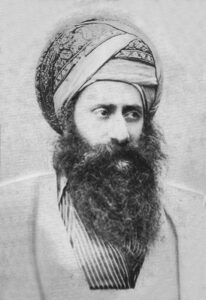 Does his name sound familiar? He has already appeared in Music Before Shabbat, in the edition about Rabbi Hagay Batzri, before Rosh Hashanah with the Keter Musaf. Hagay is a descendant of Yosef Chaim.
Does his name sound familiar? He has already appeared in Music Before Shabbat, in the edition about Rabbi Hagay Batzri, before Rosh Hashanah with the Keter Musaf. Hagay is a descendant of Yosef Chaim.
The portrait is from Wikipedia, and it is of public domain.
Very briefly, according to Breslev:
“Chacham Yosef Chaim was a great leader who guided his people through a time of religious upheaval. His contribution to Jewry was not restricted to Baghdad. His opinion on halachic (Jewish law) issues was sought throughout the Sephardi world and is still followed by thousands of people from these communities. Indeed, his decisions are considered to be of halachik significance even outside of the Sephardi communities.”
A bit of more biographic info can be useful to complete the portrait. From this very nice profile in Geni, just some selected phrases:
“His father, Hakham Eliyahu Chaim, was the active leader of the Jewish community. When he was 7 years old he fell into a pit. He was very close to dying but a miracle saved his life. When he got out the community believed it was a miracle so he decided to dedicate his life to Torah. When Yosef Chaim was only twenty-five years old, his father died. Despite his youth, the Jews of Baghdad accepted him to fill his father’s place as the leading rabbinic scholar of Baghdad.
Hakham Yosef Chaim authored over thirty other works, and there are many published Iraqi rite siddurim (prayer books) based on his rulings, which are widely used by Sephardi Jews. He wrote religious poetry for many occasions, including his most famous in this genre, “Va’amartem Ko L’Chai,” in praise of Rabbi Shimon bar Yochai.”
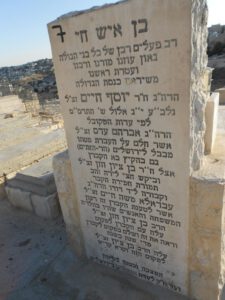 He died in Baghdad in 1909 and there are at least two tombs, one is in the Mount of Olives in Jerusalem, where it is written that his body was magically transferred to Jerusalem on the day he died and the grave-digger testified to burying him on the Mount of Olives and wanted payment for his labor. This is from this post in Seforimblog.com (the picture on the right is from that post too) and it is a fascinating story that continues. The author explains many more cases like this. The website of the Mount of Olives cemetery has an article about him. I have found a picture in a Facebook group that is said to be of the tomb in Baghdad. Check it here.
He died in Baghdad in 1909 and there are at least two tombs, one is in the Mount of Olives in Jerusalem, where it is written that his body was magically transferred to Jerusalem on the day he died and the grave-digger testified to burying him on the Mount of Olives and wanted payment for his labor. This is from this post in Seforimblog.com (the picture on the right is from that post too) and it is a fascinating story that continues. The author explains many more cases like this. The website of the Mount of Olives cemetery has an article about him. I have found a picture in a Facebook group that is said to be of the tomb in Baghdad. Check it here.
So who knows! Moreover, there is a legend that explains that there is…
“an underground tunnel – through which it was possible to pass in a very short time – connected the Diaspora to the land of Israel. According to the legend, there was no doubt of the tunnel’s existence; its entrance, however, was all but impossible to find. It is told of different scholars, including Rabbi Shalom Shabbazi of Yemen and Rabbi Yosef Chaim of Baghdad, that they would disappear from their homes on Friday and spend the Sabbath in Jerusalem, returning home only on Saturday night.”
So, maybe a friend of his took his body from Baghdad to Jerusalem through that secret tunnel! Learn another legend related to this, in the original source on Jewishagency.
Fancy a trip to Jerusalem? Then, find the entrance to the secret tunnel! ?
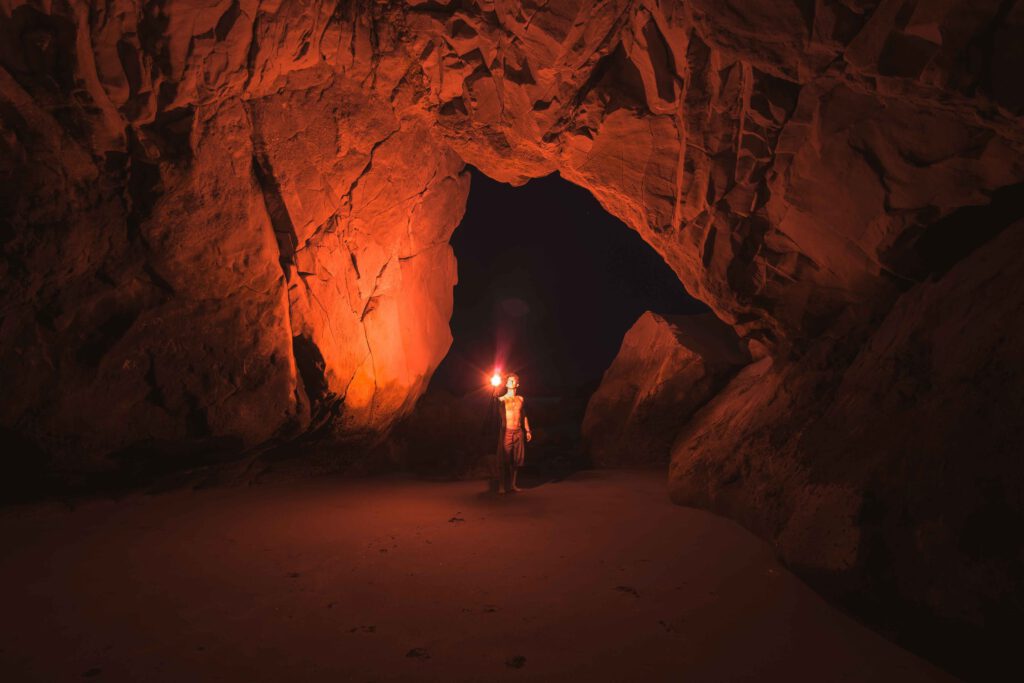
This picture is from here.
| Share this with a friend, right from here |
About Rabbi David Menachem
Contrary to many occasions, if you like today’s artist, you may be able to book him. He is alive and working. The picture is from his Facebook page, credited to the photographer Shmulik Balmas. Click here to visit his website with wonderful pictures!
According to his profile in Eshkolot* (An Ongoing Cycle of Jewish Study Programs in Moscow: edutainment events, mini-courses, workshops and study groups):
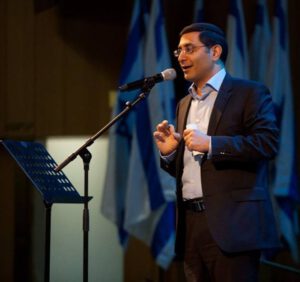 Rabbi David Menachem is a liturgical Piyyutim singer, musician and composer. Menachem was raised in the old neighborhoods of Jerusalem under the tutelage of singers of the Piyyutim and specialists of the kabbalah. His cousin, the cantor Moshe Habusha, taught him the secrets of the Arab Maqam musical system and Arabic musical instruments. Since childhood, along with pursuing his Torah studies, he has performed with Iraqi musicians, members of the Voice of Israel in Arabic Radio Orchestra. David Menachem is presently active in promoting the world of Piyyut and Middle Eastern music in Israel. He has recorded dozens of ancient hymns that he learned from his grandfather, Gurje Yair, and he specializes in teaching poetry and Jewish Studies to Israeli singers at the Yedidi Hashachachta (My friend, did you forget) program at Next to the House of Hillel. In addition, Rabbi David Menachem has performed in festivals in Israel and abroad, among them: The Piyyut Festival, The Israel Festival, The Oud Festival, and the Fes Sacred Music Festival.
Rabbi David Menachem is a liturgical Piyyutim singer, musician and composer. Menachem was raised in the old neighborhoods of Jerusalem under the tutelage of singers of the Piyyutim and specialists of the kabbalah. His cousin, the cantor Moshe Habusha, taught him the secrets of the Arab Maqam musical system and Arabic musical instruments. Since childhood, along with pursuing his Torah studies, he has performed with Iraqi musicians, members of the Voice of Israel in Arabic Radio Orchestra. David Menachem is presently active in promoting the world of Piyyut and Middle Eastern music in Israel. He has recorded dozens of ancient hymns that he learned from his grandfather, Gurje Yair, and he specializes in teaching poetry and Jewish Studies to Israeli singers at the Yedidi Hashachachta (My friend, did you forget) program at Next to the House of Hillel. In addition, Rabbi David Menachem has performed in festivals in Israel and abroad, among them: The Piyyut Festival, The Israel Festival, The Oud Festival, and the Fes Sacred Music Festival.
Menachem has his own Youtube channel in which he publishes songs and lectures (in Hebrew), his website (also in Hebrew) and a Facebook page.
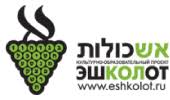
* The asterisk comes from Eshkolot. I discovered this searching for the Rabbi and their activities look so appealing! They say “Eshkolot events take place in the center of Moscow’s intellectual life; venues include intellectual clubs, universities, libraries, galleries and parks.”

? In this time of confinement, curfews and distance, this kind of event looks like a dream. If you are near Moscow, don’t miss to check their website.
Eshkolot is supported by the Genesis Philanthropy Group.
And the music piece!
Click the picture to listen to Rabbi David Menachem’s song of a poem by Rabbi Yosef Chaim:
Shabbat Shalom.
Araceli Tzigane | Mapamundi Música
